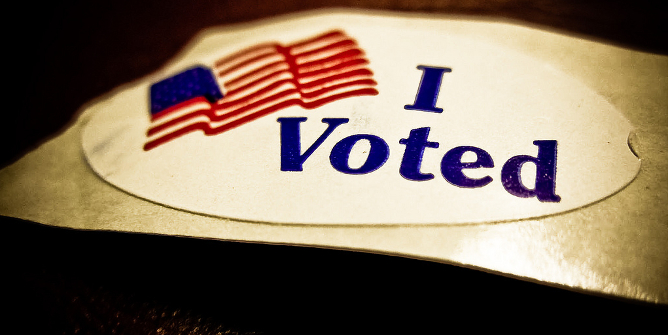USAPP Managing Editor, Chris Gilson looks at the best of the week’s political blogging from academics and think-tanks. Don’t see a blog referenced here that you think we should be reading? Let us know what we’ve missed out and we’ll try to include it next week.
Jump to
[one_half last=”no”]
The Trump Administration and the Republican Party
The Democratic Party
The House and Senate
Elections and American democracy
[/one_half][one_half last=”yes”]
The Government, Beltway and the Supreme Court
Foreign policy, defense and trade
Obamacare and health policy
The economy and society
[/one_half]
The Trump Administration and the Republican Party
On Tuesday this week, Outside the Beltway reports that former President George W. Bush has obliquely spoken out against President Trump, stating that he felt that the media was “indispensable to democracy”. They comment that Bush’s words are unlikely to change the opinion of Trump in much of the GOP, given that Bush is still well thought of largely by people who already oppose Trump’s agenda. Epic Journey also invokes a past president – this time it’s Ronald Reagan, who pushed for the US to be more open to the world, in contrast to Trump’s “America First” rhetoric.
This week, The Money Illusion writes on why they disagree with most Americans on Donald Trump; they feel (like 46 percent of Americans) that Trump should not be impeached. Why? Because the country has an established proves to vote leaders in or out every four years, and Trump has not yet committed “high crimes and misdemeanors”.
On Tuesday, Monkey Cage reviews a recent study on news coverage of Donald Trump, finding that it is very, very negative – and that includes Fox news as well.
Lawyers, Guns & Money calls Trump the “racist in chief” after his week-long silence on the shooting of two Indian-born engineers, who were likely shot because of their origins.
Recent weeks have seen President Trump condemn the leaks that are coming out of his White House, including revelations about contacts between his administration’s officials and Russia. Monkey Cage writes that the real issue about secrets and leaks is that secrets can benefit democracy by allowing the development of controversial policies and that citizens need to become more discerning about what is leaked, and by whom.
The Trump administration was due this week to release a new executive order banning immigration from seven Muslim-majority countries. Outside the Beltway reports that this new order has now been delayed, which could suggest that the administration is having a difficult time drafting a new one which would not face the same challenges in the court as the January order. On Friday, FiveThirtyEight looks at how the way that survey questions are worded affects whether people support Trump’s travel ban or not. They say it makes no difference whether the people the ban keeps out are described as being from “Muslim” countries or countries which are “linked to terrorism”, and support does not appear to be related to how long the ban lasts.
On Tuesday night, President Trump gave his first speech to a joint session of Congress. Reaction was varied: Mischiefs of Faction says that despite the praise for the remarks, a good speech should be greater than “just appropriate words and emotional manipulation”, and can’t be that good if it need the audience to disregard what he has stated recently; Outside the Beltway reckons it was Trump’s best speech so far – though still “pretty awful”; and FiveThirtyEight writes that it was both quiet, and “quietly radical” in its call for an overhaul of trade, tax, immigration and healthcare policy. On Wednesday, American Power reports on a new poll which shows that a majority of voters feel that Trump is delivering on his promises, a figure that is likely to get a bounce in the wake of the President’s address. Trump’s speech was also a general outline of his budget proposals. Rule 22 says that in proposing to repeal the current cap in defense spending, the appropriations process will face “death-by-filibuster” as eight Democratic votes will be needed.
Lawyers, Guns & Money comments this week that Trump’s tenure is basically the “third term of the [George W.] Bush administration”, with few real innovations in Republican policy at all.
Speaking of the Trump administration, Outside the Beltway says that Trump’s new Secretary of Education, Betsy DeVos has criticized university professors in her remarks at the Conservative Political Action Conference, stating that they were potentially silencing First Amendment rights by telling people “what to do, what to say” about Donald Trump.
Donald Trump’s adviser (and former Breitbart executive), Steve Bannon has stated that he wants to “deconstruct” the administrative state of the US government. Monkey Cage writes that despite Bannon’s views, President Trump really needs bureaucrats if he wishes to accomplish his goals. What he needs to do now is to secure their cooperation – and that won’t be easy.
Looking at the GOP more closely, Epic Journey this week says that the party has been “failing” in its African-American outreach efforts for 40 years despite spending millions in this area.
The Democratic Party
Last week saw the election of Tom Perez as Chair of the Democratic National Committee (DNC). Lawyers, Guns & Money says it looks like Perez, and the runner up in the contest, Keith Ellison made a deal for whoever lost to be the number two at the DNC, and also takes to task those who have argued that both of them are not interested in “class analysis”.
The recent protests against Donald Trump’s administration have prompted many commentators to wonder if they may morph into a “Tea Party of the left”. This week Mischiefs of Faction argues that these progressive protestors to his face longer odds than the Tea Party did. Why? To win, they must attract the attention of the people who pay only casual attention to politics.
In Media Res wonders how big a city needs to be to “go blue”. The comment that a special Congressional election in Wichita, Kansas, which has seen the Democratic Party nominate James Thompson – a progressive Democrat who is comfortable with guns – shows that a more balanced campaign between urban and rural issues may have a chance of success.
The House and Senate
Polyarchy writes this week that the secretive way that House Republicans have been putting together their bill to repeal and replace Obamacare is nothing new – House leaders have been doing it this way for years; it’s the most effective way to get a bill passed.
Lawfare talks Thursday on rules for Congressional investigations, following Attorney General Jeff Sessions’ recusal of himself from any probe into Trump’s campaign. They say Congress has constitutional power to investigate the Trump campaign’s Russia links, so long as it would serve a “legislative purpose” or to exercise a constitutional function.
Moving on to the still-empty Supreme Court seat, The Volokh Conspiracy has an overview of Senator Tom Udall’s (D-NM) “West Wing” plan to get both Judge Neil Gorsuch (Trump’s pick) and Judge Merrick Garland (Obama’s pick) on to the Court.
Elections and American democracy
On Thursday, Sabato’s Crystal Ball looks at how midterm elections both do and don’t differ from presidential elections; turnout is lower, the electorate is more educated, but the gender gap remains similar, and young and old voters both tend to vote Democratic, and Republican, respectively.
Oxpol writes on how journalists should deal with Donald Trump’s “alternative facts”. They argue that they should call lies lies, and focus on the substance of Trump’s statements, not the form.
Reflectivepundit this week says that America now stands at a crossroads following Donald Trump’s election, with one path leading to authoritarianism and a “new political order” of cultural and economic nationalism as envisioned by Trump’s adviser, Steve Bannon.
Election Law Blog writes Sunday that we have entered an age of “existential politics”, with the country perceived to be at stake during elections. This means that actions that have been previously thought to be out of bounds can find easy justification. Mischiefs of Faction talks on similar lines this week, commenting that many serious political crises area actually perfectly constitutional; the problem is that the Constitution effectively excludes many people from its protections. On Friday, Lawfare wonders what happens we don’t believe the oath the President’s took at his inauguration. They comment that the idea that Trump would “solemnly” swear an oath or “faithfully” execute any part of his commitment is laughable.
The Government, Beltway and the Supreme Court
On Monday, Lawfare writes on why federal IT will never be secure; it’s down to how IT security for the Federal government is defined: based on ultra-conservative, zero-failure policies.
On Wednesday, The Volokh Conspiracy looks at public ignorance around federal spending levels; 46 percent of Americans recently surveyed think that foreign aid is a large contributor to federal debt levels when it’s about 1 percent of the federal budget. They say that if people don’t know where their taxes go, then that’s an incentive for politicians to pretend that the fiscal problems can be solved without big changes to taxes or major programs. Worthwhile Canadian Initiative talks budgets this week, comparing the US’ and Canada’s spending; it seems that the proportion of non-defense program spending in both countries has been converging since the 1990s. Turning to the Federal Reserve, Outside the Beltway has the news that its Chair, Janet Yellen, has hinted at another rate increase in March, potentially sooner than expected.
Turning to the courts, Monkey Cage says that there are three ways that they can be undermined: removing judges who have different views to those of the government, appointing ideological backers, and refusing to implement court orders. The courts can be protected if the citizenry continues to be politically engaged, and when there is accurate information about the behavior of public officials. Outside the Beltway reports on the Supreme Court’s consideration of a challenge to a North Carolina sex offender case which barred a man from accessing social networking sites. The challenge has been brought under the First Amendment, given how important social media now is as a channel for political communication.
Foreign policy, defense and trade
On Tuesday, Duck of Minerva writes on the state of US-Iran relations in the wake of Donald Trump’s election. They comment that the arrival of H.R. McMaster as Donald Trump’s National Security adviser may give the administration the chance to “tone down” its previously strong anti-Tehran rhetoric, given that if the US doesn’t want to go to war, then confrontation will be counterproductive.
Monkey Cage this week writes on the three things that we need to know about the Trump administration’s “warning shots” on NATO: US concern over European allies’ defense spending is not new, NATO’s 2 percent spending target is not the best one, and the greater threat to NATO is willpower, not money. Political Violence @ a Glance meanwhile argues that the value of preserving NATO is priceless for the US when one takes into account the current value of transatlantic trade.
Despite his arguments that overseas allies are not spending enough on defense, Trump this week proposed a massive increase in military spending. Outside the Beltway reckons that the move is unnecessary, given that the US already far outspends every other country in this area.
FiveThirtyEight this week looks at how a weakened Mexican economy, and any associated political instability and unrest, could threaten US security.
Obamacare and health policy
Balkinization this week discusses what they call the “tragedy of the Medicaid expansion”, which occurred after the Supreme Court made the Affordable Care Act’s Medicaid expansion optional for state governments. They write that Southern states refusal to expand Medicaid has had drastically bad health implications for what are historically poor (often African-American) populations.
Lawyers, Guns & Money reflects on the recent spike in the popularity of Obamacare, commenting that the Democratic Party’s messaging on the program seems not to have mattered a great deal – the public’s new-found affinity with it is more structural.
On Wednesday, Nursing Clio looks at abortion rights and realities in the Trump era. They comment that Trump’s recent actions have many abortion rights activists and scholars wondering if we are entering a new reality which will again deny American women access to safe and legal abortions.
The economy, society and criminal justice
On Saturday, Angry Bear looks at what they call the “$24 trillion dollar bezzle”, referring to the growth in the net worth of households; the product of tax cuts and banking deregulation. They worry that if economic growth does not “gush forth” then these values are going to have to come back down to earth. Monkey Cage this week talks on what might happen if the financial markets panic about Trump; investors may begin to change their minds about buying US debt, which may mean that the US Treasury has to offer higher interest rates, meaning less money for the government. The Money Illusion examines the idea of the “Trump rally”, the connection made by many commentators between the stock market’s rise and Trump’s election. They remind us that the stock market is definitively not the economy, and that it may just be booming because of expectations about further wealth redistribution towards the rich under Trump.
From a rally to a “Trump slump” – Outside the Beltway looks this week at the noticeable drop in tourism from other countries that coincide with Donald Trump’s election. They urge caution though; the drop may have been caused by a number of factors, of which Trump’s election might only be a small part.
On Monday, RegBlog talks on the long-standing problem of the excessive use of police force in the US. They write that real reform is not possible without the democratization of policing via community participation among the communities most affected.
On Thursday, FiveThirtyEight looks at a request made to the Supreme Court by an Alabama death row inmate who wants to be executed by firing squad, and not lethal injection. The request stems from the now often unreliable drugs used for lethal injections which have led to inmates to appear to be dying in pain for long periods of time.
By Office of the Speaker [Public domain], via Wikimedia Commons
Please read our comments policy before commenting.
Note: This article gives the views of the author, and not the position of USAPP– American Politics and Policy, nor of the London School of Economics.
Shortened URL for this post: http://bit.ly/2mOHM7X






